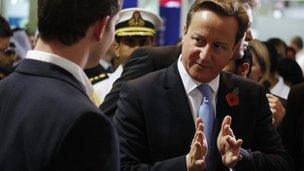Britain lined up as Europe's fall guy
- Published
- comments

The divide between Britain and Germany is small but hard to close
These are difficult days for Britain in Europe. Allies are wary. Old friendships under strain. There is increasing impatience with the UK and what are seen as its incessant demands to be treated as a special case.
In the current debate about the next seven-year EU budget the finger of blame is firmly pointed at Britain. The Commissioner for Financial Programming, Janusz Lewandowski, makes the case that more Europe means more money.
Almost in the same breath - and unusually for a commissioner - . "Either they see their future in the EU in the long term or they don't," he said.
Then a Polish minister, Elzbieta Bienkowska, was quoted as saying that "the rest of Europe is ready to conclude the budget by the end of this year and the only country that is saying 'no' is Great Britain".
That is, of course, untrue. The French have threatened to use their veto if farm subsidies are threatened. The Danes want a rebate and might also use their veto if they do not get it. The Swedes, particularly angry at the amount ear-marked for agriculture, want deep cuts.
Germany, too, objects to the European Commission's proposal for a 5% increase. It is difficult to be precise with the figures as countries use different starting points and different criteria. Broadly speaking, the Commission wants a budget of 1.1 trillion euros (拢880bn). The Germans want about 100bn euros less and Britain aims for a figure about 70bn lower than that.
In fact, the British and German positions are not that far apart. But here is the difference. The Germans expect to compromise. The British cannot. David Cameron is seen as in a bind. It will be difficult for him to return home with anything less than a budget freeze allowing for inflation.
He is most unlikely to get that, and the expectation is of another British veto. On Wednesday, Angela Merkel will visit David Cameron and seek a compromise. It is difficult to see what she can offer.
Mood sours
What irritates so many other Europeans is that Britain shows no enthusiasm for the European idea. Its approach is entirely about what it gets out of the project. This grates because Europe's officials and its political class are beleaguered. Despite outbursts of optimism, the eurozone crisis has not been fixed. Only this weekend, Chancellor Merkel said the eurozone will take at least another five years to recover. It has to be doubtful whether the people of Greece, Spain, Portugal and Italy will wait that long.
The German and EU prescription for the crisis is "more Europe" . Britain wants "less Europe".
David Cameron wants safeguards for the City of London; many Europeans blame its "casino capitalism" for the crisis. Angela Merkel says more sovereignty will have to be passed to Brussels; the British want to get powers back. Although it is more nuanced, Britain often seems to be travelling in the opposite direction to the rest.
At the highest levels in Germany they want Britain to remain at the heart of Europe. (The two countries share an instinct for free trade and an open economy).
Elsewhere in Europe, however, the mood has soured towards Britain. In a recent conversation I was surprised to hear someone saying they would "relish" a British exit. The key for the Germans is that Britain does not obstruct. Which brings us back to the budget. Britain is being lined up to be the fall guy for failure.